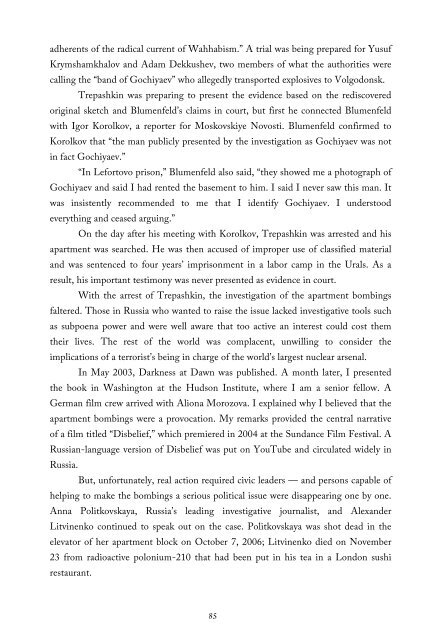You also want an ePaper? Increase the reach of your titles
YUMPU automatically turns print PDFs into web optimized ePapers that Google loves.
adherents of the radical current of Wahhabism.” A trial was being prepared for Yusuf<br />
Krymshamkhalov and Adam Dekkushev, two members of what the authorities were<br />
calling the “band of Gochiyaev” who allegedly transported explosives to Volgodonsk.<br />
Trepashkin was preparing to present the evidence based on the rediscovered<br />
original sketch and Blumenfeld’s claims in court, but first he connected Blumenfeld<br />
with Igor Korolkov, a reporter for Moskovskiye Novosti. Blumenfeld confirmed to<br />
Korolkov that “the man publicly presented by the investigation as Gochiyaev was not<br />
in fact Gochiyaev.”<br />
“In Lefortovo prison,” Blumenfeld also said, “they showed me a photograph of<br />
Gochiyaev and said I had rented the basement to him. I said I never saw this man. It<br />
was insistently recommended to me that I identify Gochiyaev. I understood<br />
everything and ceased arguing.”<br />
On the day after his meeting with Korolkov, Trepashkin was arrested and his<br />
apartment was searched. He was then accused of improper use of classified material<br />
and was sentenced to four years’ imprisonment in a labor camp in the Urals. As a<br />
result, his important testimony was never presented as evidence in court.<br />
With the arrest of Trepashkin, the investigation of the apartment bombings<br />
faltered. Those in Russia who wanted to raise the issue lacked investigative tools such<br />
as subpoena power and were well aware that too active an interest could cost them<br />
their lives. The rest of the world was complacent, unwilling to consider the<br />
implications of a terrorist’s being in charge of the world’s largest nuclear arsenal.<br />
In May 2003, Darkness at Dawn was published. A month later, I presented<br />
the book in Washington at the Hudson Institute, where I am a senior fellow. A<br />
German film crew arrived with Aliona Morozova. I explained why I believed that the<br />
apartment bombings were a provocation. My remarks provided the central narrative<br />
of a film titled “Disbelief,” which premiered in 2004 at the Sundance Film Festival. A<br />
Russian-language version of Disbelief was put on YouTube and circulated widely in<br />
Russia.<br />
But, unfortunately, real action required civic leaders — and persons capable of<br />
helping to make the bombings a serious political issue were disappearing one by one.<br />
Anna Politkovskaya, Russia’s leading investigative journalist, and Alexander<br />
Litvinenko continued to speak out on the case. Politkovskaya was shot dead in the<br />
elevator of her apartment block on October 7, 2006; Litvinenko died on November<br />
23 from radioactive polonium-210 that had been put in his tea in a London sushi<br />
restaurant.<br />
85



